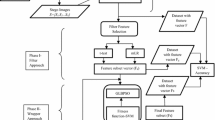Abstract
This paper presents a methodology to select features before training a classifier based on Support Vector Machines (SVM). In this study 23 features presented in [1] are analysed. A feature ranking is performed using a fast classifier called K-Nearest-Neighbours combined with a forward selection. The result of the feature selection is afterward tested on SVM to select the optimal number of features. This method is tested with the Outguess steganographic software and 14 features are selected while keeping the same classification performances. Results confirm that the selected features are efficient for a wide variety of embedding rates. The same methodology is also applied for Steghide and F5 to see if feature selection is possible on these schemes.
Preview
Unable to display preview. Download preview PDF.
Similar content being viewed by others
References
Fridrich, J. (ed.): IH 2004. LNCS, vol. 3200, pp. 67–81. Springer, Heidelberg (2004)
Dumitrescu, S., Wu, X., Wang, Z.: Detection of LSB steganography via sample pair analysis. IEEE transactions on Signal Processing, 1995–2007 (2003)
Roue, B., Bas, P., Chassery, J.-M.: Improving lsb steganalysis using marginal and joint probabilistic distributions. In: Multimedia and Security Workshop, Magdeburg (2004)
Lyu, S., Farid, H.: Detecting hidden messages using higher-order statistics and support vector machines. In: Petitcolas, F.A.P. (ed.) IH 2002. LNCS, vol. 2578, pp. 340–354. Springer, Heidelberg (2003)
Pevný, T., Fridrich, J.: Towards Multi-class Blind Steganalyzer for JPEG Images. In: Barni, M., Cox, I., Kalker, T., Kim, H.-J. (eds.) IWDW 2005. LNCS, vol. 3710, pp. 39–53. Springer, Heidelberg (2005)
Weston, J., Mukherjee, S., Chapelle, O., Pontil, M., Poggio, T., Vapnik, V.: Feature selection for SVMs. In: Leen, T.K., Dietterich, T.G., Tresp, V. (eds.) NIPS, pp. 668–674. MIT Press, Cambridge (2000)
Efron, B., Tibshirani, R.: An Introduction to the Bootstrap. Chapman and Hall, London (1993)
Zhang, T.: An introduction to support vector machines and other kernel-based learning methods. AI Magazine, 103–104 (2001)
Rossi, F., Lendasse, A., François, D., Wertz, V., Verleysen, M.: Mutual information for the selection of relevant variables in spectrometric nonlinear modelling. Chemometrics and Intelligent Laboratory Systems 80, 215–226 (2006)
Provos, N.: Defending against statistical steganalysis. In: USENIX (ed.) Proceedings of the Tenth USENIX Security Symposium, Washington, DC, USA, August 13–17 (2001)
Ronneberger, O.: Libsvmtl extensions to libsvm (2004), http://lmb.informatik.uni-freiburg.de/lmbsoft/libsvmtl/
Author information
Authors and Affiliations
Editor information
Editors and Affiliations
Rights and permissions
Copyright information
© 2006 Springer-Verlag Berlin Heidelberg
About this paper
Cite this paper
Miche, Y., Roue, B., Lendasse, A., Bas, P. (2006). A Feature Selection Methodology for Steganalysis. In: Gunsel, B., Jain, A.K., Tekalp, A.M., Sankur, B. (eds) Multimedia Content Representation, Classification and Security. MRCS 2006. Lecture Notes in Computer Science, vol 4105. Springer, Berlin, Heidelberg. https://doi.org/10.1007/11848035_9
Download citation
DOI: https://doi.org/10.1007/11848035_9
Publisher Name: Springer, Berlin, Heidelberg
Print ISBN: 978-3-540-39392-4
Online ISBN: 978-3-540-39393-1
eBook Packages: Computer ScienceComputer Science (R0)




